BBC BASIC is an interpreted version of the BASIC programming language. It was developed by Acorn Computers Ltd when they were selected by the BBC to supply the computer for their BBC Literacy Project in 1981.

Risc PC was a range of personal computers launched in 1994 by Acorn and replaced the preceding Archimedes series. The machines had a unique architecture unrelated to IBM PC clones and were notable for using the Acorn developed ARM CPU which is now widely used in mobile devices.
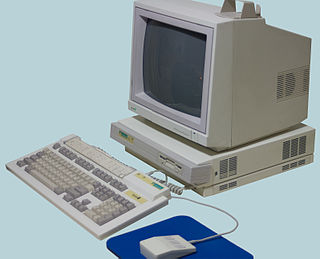
Acorn Archimedes is a series of personal computers designed by Acorn Computers in Cambridge, England, that were launched in 1987. These systems were powered by Acorn's own ARM architecture processors and ran on proprietary operating systems: Arthur and RISC OS. The Archimedes family was sold until the mid-1990s.

RISC OS is a computer operating system originally designed by Acorn Computers Ltd in Cambridge, England. First released in 1987, it was designed to run on the ARM chipset, which Acorn had designed concurrently for use in its new line of Archimedes personal computers. RISC OS takes its name from the reduced instruction set computer (RISC) architecture it supports.
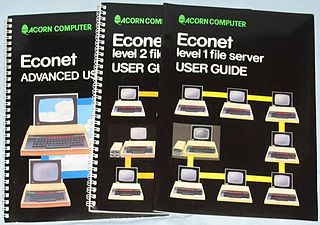
Econet was Acorn Computers's low-cost local area network system, based on a CSMA-CD serial protocol carried over a five-wire data bus, intended for use by schools and small businesses. It was widely used in those areas, and was supported by a large number of different computer and server systems produced both by Acorn and by other companies.
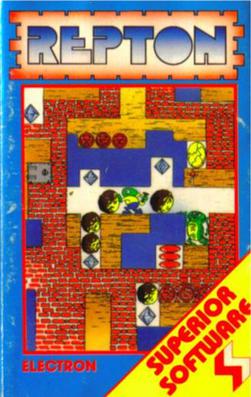
Repton is a video game originally developed by 16-year-old Briton Tim Tyler for the BBC Micro and Acorn Electron and released by Superior Software in 1985. The game spawned a series of follow up games which were released throughout the 1980s. The series sold around 125,000 copies between 1985 and 1990 with Repton 2 selling 35,000 itself. The games have since been remade for several modern systems, including iRepton for the iPhone / iPod Touch in 2010, and Android Repton 1, Android Repton 2 and Android Repton 3 from 2016 to 2018.
Timeworks Publisher was a desktop publishing (DTP) program produced by GST Software in the United Kingdom and published by Timeworks, Inc., in the United States.
Xara is an international software company founded in 1981, with an HQ in Berlin and development office in Hemel Hempstead, UK. It has developed software for a variety of computer platforms, in chronological order: the Acorn Atom, BBC Micro, Z88, Atari ST, Acorn Archimedes, Microsoft Windows, Linux, and more recently web browser-based services.
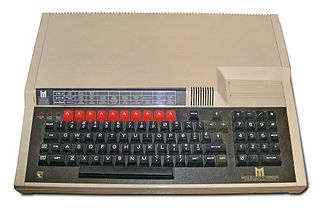
The BBC Master is a home computer released by Acorn Computers in early 1986. It was designed and built for the British Broadcasting Corporation (BBC) and was the successor to the BBC Micro Model B. The Master 128 remained in production until 1993.

Apocalypse is a futuristic 3D space shoot 'em up game released in 1990 for the Acorn Archimedes written by Gordon J. Key and published by The Fourth Dimension.
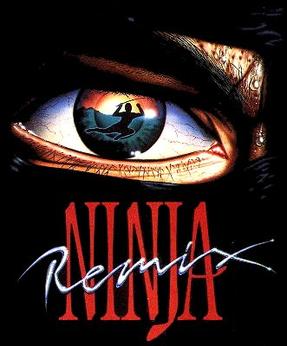
Last Ninja is a series of video games published by System 3. The first game in the series titled The Last Ninja, was released in 1987 for the Commodore 64 and was one of the most successful games for the system. In 1988, System 3 released Last Ninja 2, and in 1991 the third game in the series, Last Ninja 3. In 1990, Last Ninja Remix was released for 8-bit systems. This was Last Ninja 2 with new music, a new introductory sequence, slightly changed graphics and fixed bugs. Confusingly, the 16-bit versions of the original The Last Ninja game were also released in 1990 as Ninja Remix.

The Machine Operating System (MOS) or OS is a discontinued computer operating system (OS) used in Acorn Computers' BBC computer range. It included support for four-channel sound, graphics, file system abstraction, and digital and analogue input/output (I/O) including a daisy-chained expansion bus. The system was single-tasking, monolithic and non-reentrant.

Stryker's Run is a video game designed by Chris Roberts and Philip Meller for the BBC Micro and BBC Master which was published by Superior Software in 1986. It was also later converted to the Acorn Electron. It is a 2D side-scrolling action game. It was well received, particularly for its graphics.
Designer Castles was a software title for the BBC Micro and later Acorn Archimedes range of computers.
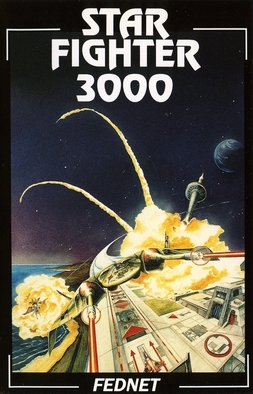
Star Fighter or Star Fighter 3000 is a 3D flight-based shoot-em-up developed and published by UK company Fednet Software, and released in 1994 for the Acorn Archimedes. The gameplay is mission based and involves elements of strategy and planning. The player can order wingmen to fly in formation and attack specific targets.

The BBC Microcomputer System, or BBC Micro, is a series of microcomputers designed and built by Acorn Computers Limited in the 1980s for the Computer Literacy Project of the BBC. The machine was the focus of a number of educational BBC TV programmes on computer literacy, starting with The Computer Programme in 1982, followed by Making the Most of the Micro, Computers in Control in 1983, and finally Micro Live in 1985.
RISC OS, the computer operating system developed by Acorn Computers for their ARM-based Acorn Archimedes range, was originally released in 1987 as Arthur 0.20, and soon followed by Arthur 0.30, and Arthur 1.20. The next version, Arthur 2, became RISC OS 2 and was completed and made available in April 1989. RISC OS 3 was released with the very earliest version of the A5000 in 1991 and contained a series of new features. By 1996 RISC OS had been shipped on over 500,000 systems.
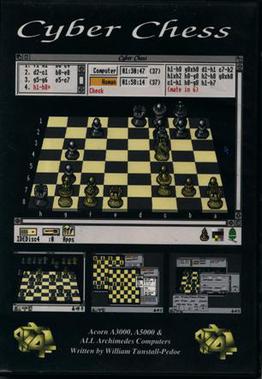
Cyber Chess is a chess-playing computer program developed by William Tunstall-Pedoe. It was written for the Acorn Archimedes and published commercially by The Fourth Dimension.
Gordon J. Key authored video game software for the Acorn BBC Micro, Electron and RISC OS platforms in the 1980s and 1990s. His most well-known works were published by The Fourth Dimension. He is also credited with additional programming routines in FedNet's futuristic flight combat game Star Fighter 3000 (1994), and authored Party Machine for the Amstrad CPC.

The Dungeon is a single player real-time role-playing video game featuring a 3D first-person perspective with texture mapping. It was published by The Fourth Dimension for the Acorn Archimedes home computer in 1993.













